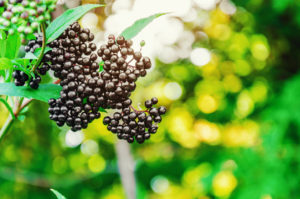 The fruit and flowers of Elderberry (Sambucus nigra) have been traditionally used to treat and help to prevent common colds and the flu. Sambucus nigra is a species complex of flowering plants in the family Adoxaceae native to most of Europe and North America. Common names include elder, elderberry, black elder, European elder, European elderberry, and European black elderberry native to a large area of North America east of the Rocky Mountains, south to Bolivia. It grows in a variety of conditions as a deciduous shrub or small tree including both wet and dry soils, primarily in partly sunny or sunny locations. I see it in my Pacific NW woods and in my childhood Oregon coast town where it is quite prolific.
The fruit and flowers of Elderberry (Sambucus nigra) have been traditionally used to treat and help to prevent common colds and the flu. Sambucus nigra is a species complex of flowering plants in the family Adoxaceae native to most of Europe and North America. Common names include elder, elderberry, black elder, European elder, European elderberry, and European black elderberry native to a large area of North America east of the Rocky Mountains, south to Bolivia. It grows in a variety of conditions as a deciduous shrub or small tree including both wet and dry soils, primarily in partly sunny or sunny locations. I see it in my Pacific NW woods and in my childhood Oregon coast town where it is quite prolific.
The flowers are high in phenolic acids, sterols, flavonoids, mucilage, tannins and volatile oils containing triterpenes. The flowers are historically used in acute respiratory diseases serious otitis, acute otitis media, acute influenza, fever, and URI as well as their beneficial effects on lowering blood sugar levels. Broad mechanisms of action of the berry (considered a superfood by many) and flower include anti-viral, anti-inflammatory, anti-oxidant and immunotonic properties
Elderberry fruit extracts have been shown to have antimicrobial and antiviral properties with some evidence that elderberry extracts have protective qualities against several strains of influenza viruses by inhibiting viral replication and activating the immune response.
The current review of data bases was searched through May 2020. The articles that were included were those that were prospective intervention studies in adults with acute respiratory viral infections that were written in English. Studies in children were excluded or studies that involved participants with fungal or non-infectious respiratory disease. What was left identified, was forty studies. There were 10 duplicate studies amongst the 40 publications, which leaves 30. Then, additional studies were excluded due to a study being a review of other studies and not an original study, or an undesirable study design or other miscellaneous study problems. In the end, 5 studies met the criteria for this study review article. The conditions studied included influenza, influenza-like symptoms, and the common cold. Four of the studies used an elderberry extract and one study used an herbal blend of 240 mg echinacea and elderberry. Doses varied depending on the form of elderberry, but included 15 mL four times per day, three capsules per day, 175 mg lozenge four times a day, or 5 mL of the blend five times a day for 1-3 days followed by a maintenance dose of twice a day for 4-10 days.
Observations included an overall reduction of symptoms, a shorter duration of illness and the rate of recovery, and the decreased use of rescue medication. All 5 studies reported a reduction in the severity of symptoms, four studies reported a reduction in fever and one study reported reductions in other symptoms such as headache, muscle ache, nasal congestion, mucus discharge and cough symptoms. One of the studies even reported a reduction in symptoms within 48 h in the elderberry group compared to an increase in severity of symptoms over 48 hours in the control group. Three studies reported an almost 50% shorter duration of illness in the elderberry verses control groups.
Commentary: According to this review, if elderberry is taken at the onset of symptoms, and for up to two weeks, this may shorten the duration of illness and reduce the symptoms in both the common cold and influenza. Elderberry extract may also be effective in reducing the duration and severity of fevers, headaches, nasal congestion, and nasal discharge that typically comes with acute viral upper respiratory infections. Not bad for a simple bush found in many forests.
Reference: Harnett J, Oakes K, Caré J, et al. The effects of Sambucus nigra berry on acute respiratory viral infections: A rapid review of clinical studies. Adv Integr Med. December 2020;7(4):240-246.

